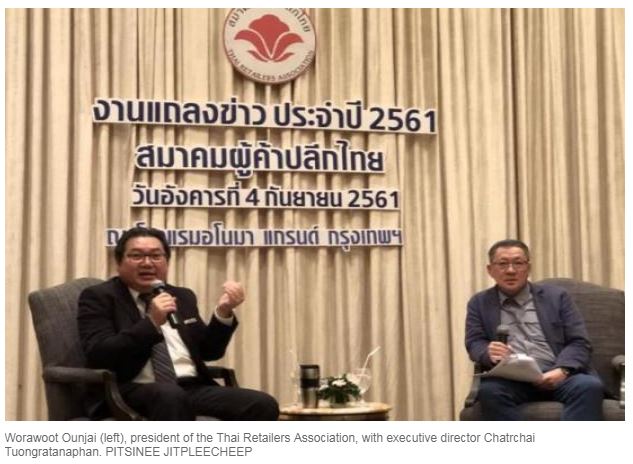Thailand: Simpler VAT refunds urged to boost sales
The government should let private operators run downtown VAT refund booths as part of the push to develop Thailand as a shopper’s paradise, says the head of the Thai Retailers Association (TRA).
The VAT refund services for tourists are available at certain department stores but remain limited, according to Worawoot Ounjai, the newly appointed TRA president.
Under the VAT refund process, foreign tourists must present the tax refund forms obtained at customs offices, along with the VAT receipts issued by participating shops and the items purchased, to customs officers to be checked and stamped upon departure from Thailand.
Tourists then submit the documents at the VAT refund booth inside the airport.
The Revenue Department gives 5% VAT back to foreign tourists who claim a tax refund, while the remaining 2% is deducted for the department’s processing fee.
To qualify for the VAT refund, each claimed purchase must have a value of at least 2,000 baht.
“If we want to make it convenient for tourists, the government must promote the free operation of downtown duty- and tax-free shopping, especially in provinces with high tourism,” Mr Worawoot said. “With the proliferation of downtown duty- and tax-free shops and VAT-free shops, tourists will be encouraged to spend more in Thailand. This will bring more income to many business sectors, be it retail, hotels, spas, mass transit, restaurants or other businesses.”
According to Mr Worawoot, retailers are set to partner with Global Blue, a well-known tax refund company, to provide services to tourists in Thailand if the government endorses the plan.
The partnership with a third party like Global Blue will make tax refund services for tourists more transparent and catch up to international standards, Mr Worawoot said.
“Global Blue has tried to offer services in Thailand for more than two decades but has had no opportunity,” he said.
Mr Worawoot said the government should also allow more downtown duty- and tax-free shops without the limitation of the pickup counters.
He said the upcoming auction for airport duty-free concessions must be transparent and fair. He recommended the government lower the concession period to 5-7 years, the international standard, from the current 10 years, and raise the concession fees to the government to the international standard of 30-40%, compared with the 15-19% now collected from duty-free operators.
“At present, there is no process showing transparency in concession granting,” Mr Worawoot said. “Airports of Thailand uses the format of a master concession, which is monopolistic and does not give rise to fair competition, causing limitations in the range of products and quality of service. It is therefore proposed to consider changing from a master concession to a system of concession by category.”
The lifetime of the concession is as long as 10 years and can be further extended without bidding. The TRA proposes a concession of 5-7 years with no extension.
Reducing the lifetime of the concession would help prevent a long-term monopoly by a single operator and stimulate innovation in terms of product quality and customer experience, Mr Worawoot said.
He said shopping has become a major tourism trend in the past decade.
“Studies have found that shopping tourism has led to tourists spending more time at a destination, while the spending of this group is three or four times greater than that of leisure tourists,” Mr Worawoot said.
Chatrchai Tuongratanaphan, the TRA’s executive director, said every country in Asean has been trying to stimulate tourism. Retail growth in turn has reached 8-12% in each country.
Visitors to Thailand spend 4,000 baht a day per person, mostly for hotel and food, but the portion for shopping is just 1,200-1,500 baht, according to the Tourism Authority of Thailand.
Source: https://www.bangkokpost.com/business/news/1534170/simpler-vat-refunds-urged-to-boost-sales


 Thailand
Thailand




